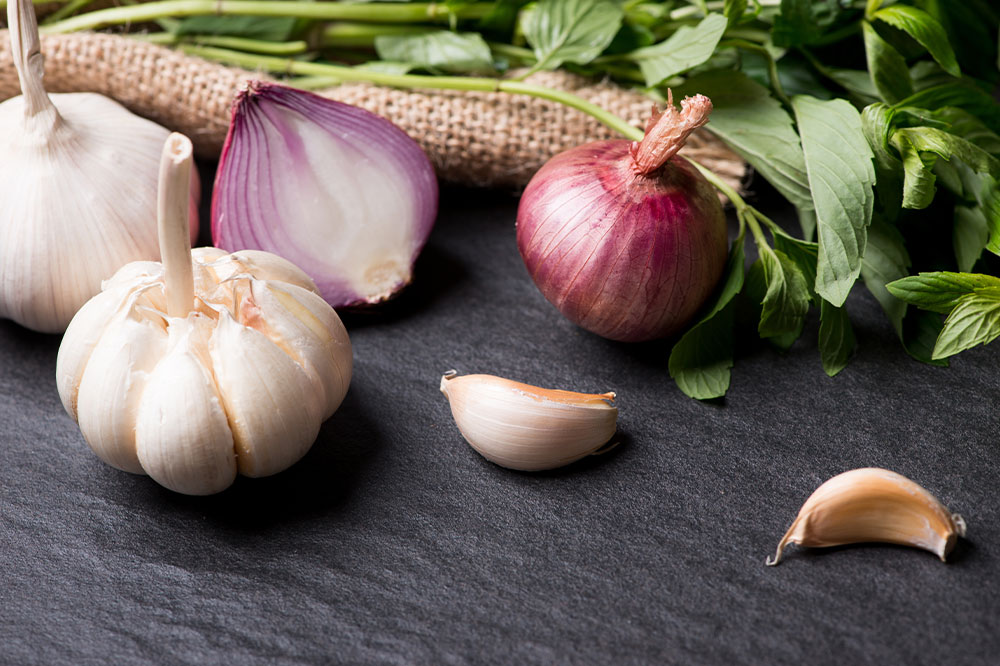
Avoid these 9 foods that can trigger heartburn
Heartburn is a common symptom of gastroesophageal reflux disease (GERD). Here, fluids in the stomach flow back into the esophagus, causing pain and irritation. This is a direct result of the lower esophageal sphincter (LES) not being able to hold back digestive juices after letting foods and beverages pass through the stomach. Certain foods and beverages can trigger heartburn and so should be avoided when dealing with GERD or a similar condition.
Allium vegetables
Onions, garlic, and shallots are allium vegetables rich in fermentable oligosaccharides, disaccharides, monosaccharides, and polyols (or FODMAPs). With the intake of high FODMAP foods, the fermentable fibers react with gut bacteria to produce stomach acid. So, excessive intake of such foods can trigger the overproduction of stomach acids that leak into the esophageal cavity.
Citrus fruits
Citrus fruits like oranges, lemons, and limes are naturally rich in acidic content that churns up stomach acids. The digestive juices back up into the esophagus, triggering irritation. This can be brought on by an imbalance in the pH levels the body needs to maintain for digestion. Even tomatoes can trigger acid reflux when eaten raw in a salad or pureed to make a sauce. So, citrus fruits can increase the acidity in the stomach, making them key foods to avoid for managing heartburn. Bananas and melons are acceptable substitutes that can also help provide quick relief from the reflux.
Processed foods
Processed foods are laced with saturated fats, trans fats, and additives to improve their taste and shelf life. However, highly fatty foods affect digestion and force the LES to relax. This can make the stomach acid back up into the esophagus. Common fatty eats to avoid include French fries, potato chips, fried snacks, dairy products, salad dressing, and extremely fatty cuts of deli meats. Nutritionists instead suggest adding more fiber-rich foods to promote digestion to prevent flare-ups.
Red meat
Red meats like beef, lamb, and pork are high in fats and contain strong compounds that are released when cooking on high heat. This includes baking, grilling, broiling, or searing meat. The fats relax the sphincter muscles that prevent acid from backing up. Certain compounds released on eating meats can affect pH balance and disrupt gut bacteria. Red meats are also difficult to digest, so the stomach and intestines work overtime to break down the meat fibers.
Spicy foods
Capsaicin is one of the key compounds in spices that irritates the esophagus and worsens symptoms linked to heartburn. Capsaicin also slows down digestion, making foods and beverages linger in the stomach longer.
Sugary foods
Foods and fruits with a high glycemic index can spike blood glucose levels. Even refined sugars are empty calories that add no nutritional value. They are added to enhance the taste of foods. While it does not directly cause acid reflux, studies reveal that lowering sugar intake can help the body better manage the symptoms and discomfort associated with heartburn.
Peppermint
Peppermint is a really potent herb used for adding freshness to dishes and beverages. Mint can help relieve throat irritation. However, peppermint can sometimes trigger acid reflux directly. Mint can make the LES muscles relax, allowing the stomach acids to back up into the esophagus.
Caffeinated food and drinks
Coffee, chocolates, and other beverages or snacks containing caffeine should be avoided when dealing with frequent heartburn. Caffeine is a stimulant that causes the relaxed LES to remain open, allowing fluids from the stomach to move to the esophagus. Tea is another caffeine-rich beverage that should be avoided or limited, especially when dealing with common gastrointestinal diseases.
Carbonated beverages
Fizzy drinks, flavored sodas, sparkling water, and other beverages that contain dissolved carbon dioxide can worsen acid reflux. The gas released upon drinking these drinks causes bubbles to form in the stomach acid. These bubbles float, forcing the stomach to expand and open the LES flap. Also, flavored sodas are already acidic in nature, making them must-avoid beverages when dealing with heartburn.
Additionally, having large heavy meals at night just before bed can also slow down digestion and cause heartburn. So, one should opt for smaller meals before bedtime and ensure they have enough to stay satiated. If one experiences frequent heartburn symptoms, they should consult a doctor or a nutritionist to get a meal plan to substitute trigger foods.


